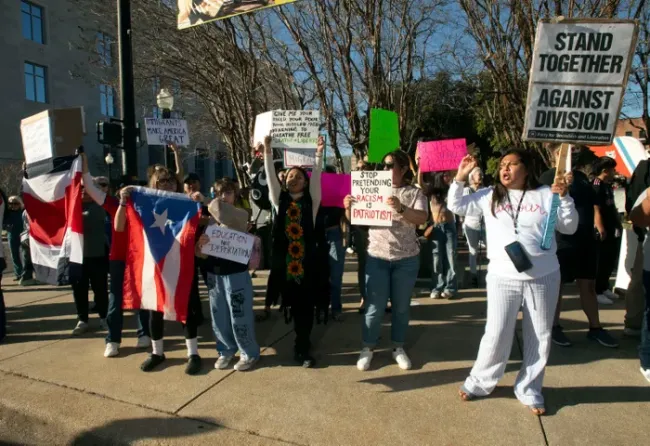Day Without Immigrants Protests 2025: Nationwide Strikes and Marches Oppose Trump's Deportation Policies
Nationwide protests erupted across the U.S. on February 3, 2025, as the "Day Without Immigrants" movement rallied against President Trump’s mass deportation policies. Immigrant communities, along with supporters, shut down freeways, staged marches, and held strikes, sending a powerful message about the essential role of immigrant labor in the nation's economy and calling for an end to ICE raids and anti-immigrant measures.
Los Angeles: Freeway Shutdowns and Continued Protests
In Los Angeles, thousands of protesters shut down the 101 Freeway on February 2, disrupting traffic in a dramatic demonstration against President Trump’s immigration policies. The protesters, many draped in Mexican and Salvadoran flags, chanted slogans such as “MAGA — Mexicans always get across” and “Don’t bite the hand that feeds you,” underscoring the vital role immigrant labor plays in California’s economy. The protest, organized in response to recent ICE raids targeting undocumented people, featured traditional music and freeway occupations that lasted for hours before participants dispersed voluntarily.
The following day, protests continued downtown, with smaller groups gathering outside City Hall and federal courthouses. Activists like 18-year-old Nailah Esparza, who found out about the protests through TikTok, emphasized the importance of youth-led activism: “We’re here for our people. We need to stand up for our gente.”
San Diego: Rally at the "Coming Together" Sculpture
On February 2, over a thousand protesters marched in San Diego from the Convention Center to the symbolic “Coming Together” sculpture on Park Boulevard. The rally aimed to show solidarity with immigrant communities amid increased ICE enforcement. The sculpture, symbolizing unity, was the focal point, with participants holding banners that read “Nobody is illegal.” In Santa Ana, El Sol Academy reported more than 180 student absences on February 3, as families joined the national strike.
Las Vegas and Nationwide "Day Without Immigrants" Strike
The “Day Without Immigrants” movement spread across the U.S. on February 3, with businesses closing and workers refraining from economic activities in protest of Trump’s deportation policies. In Las Vegas, activists participated in the “weekend of resistance,” joining nationwide demonstrations calling for an end to ICE raids and anti-immigrant measures. Latino-owned businesses, from quinceañera boutiques in Omaha to car dealerships in Baltimore, closed their doors in solidarity. Schools in cities like Chicago and Los Angeles also reported empty classrooms.
While many workers cited financial insecurity as a barrier to participation, the strike made a powerful statement about the economic necessity of immigrants. “If we don’t have immigrants, we don’t have anything to work around here,” said Andrea Toro, a Puerto Rican salon owner in Chicago, who closed her business for the day.
ICE Raids and Legal Challenges
These protests followed a series of ICE raids authorized by Trump’s January 23 executive orders, which granted expanded enforcement powers to agencies like the DEA and U.S. Marshals. Over 8,276 arrests were confirmed between January 23 and 31, including the detention of non-criminal migrants, sparking widespread condemnation. In Newark, ICE agents detained veterans and citizens without warrants, prompting local officials to denounce the actions.
In response, the ACLU and coalition partners filed a federal lawsuit challenging Trump’s asylum restrictions, arguing that the policies violate protections for refugees fleeing persecution.
Economic and Cultural Impact
The protests drew attention to the significant contributions immigrants make to a wide range of industries, from agriculture to tech. Restaurants like Teddy’s Red Taco in California and Republic Cantina in D.C. closed, while grocery stores like Georgia’s Jalisco Supermarket highlighted the economic power of the Hispanic community. In Minnesota, El Burrito Mercado operated with a skeleton crew, balancing solidarity with the needs of the community.
“The power of these protests lies more in the message than in the immediate disruption,” said UCLA labor expert Victor Narro, noting the growing dependence on immigrant labor as U.S. birth rates decline.
Looking Ahead
Organizers are committed to keeping the pressure on Trump’s policies, with plans for more strikes and legal challenges in the future. As Reyna, an undocumented restaurant worker in Santa Ana, put it: “We are part of this economy. We just want something better.”
